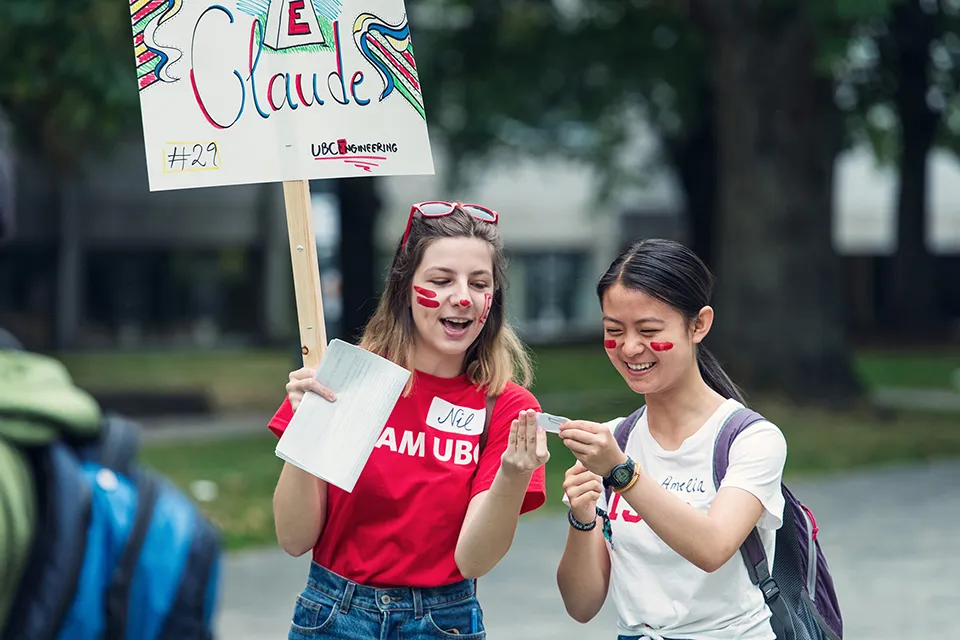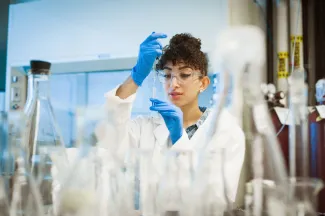“Your degree is only as awesome as you allow it to be—take as many opportunities as possible to prototype what you enjoy doing over this adventure.”

Amelia Dai
- Degree:
- Bachelor of Applied Science
- Grad year: 2023
- Program:
- Campus: Vancouver
I am a graduating Chemical and Biological Engineering (CHBE) student. My professional interests include renewable energy, process optimization, and exploring what makes a great team. Between my study terms, I sought opportunities to explore the roles of energy and engineering in society from different perspectives, leading me to 36 months of internships ranging from lab-scale to manufacturing-scale, from academia to industry, and from electrical utility to multinational corporations. I loved the research experiences the best (with Dr. David Wilkinson’s group in CHBE and the Cell Development Lab at Tesla), which guided me to pursue graduate studies. I will be starting my PhD in ChemE at MIT in the coming fall.
Outside of class, I have had the pleasure of volunteering with the Engineering Undergraduate Society (EUS), Women in Engineering (WiE), and the CHBE community during my time at UBC. Some of my favourite experiences include organizing Week E^0 (welcoming first-year engineering students), facilitating the WiE mentorship program for girls in high school during COVID, and making liquid-nitrogen ice cream for CHBE events. In my free time, I enjoy reading, painting, exploring new places and food, appreciating nature and cute animals.
8 things that made my time at UBC memorable:
- The vibrant engineering spirit: “we are, we are, we are the engineers!”
- Engineering Undergraduate Society: my home away from home.
- Friends: my family away from home.
- Mentors: thank you for supporting me to accomplish more than what I could have imagined.
- The beautiful campus: a variety of gardens, museums, galleries, and patches of nature within walking distance.
- Sunrise and sunset views: from a tall building or a beach, to get that mountain and ocean view.
- Flowers: especially the cherry blossoms on Lower Mall.
- Dogs: so many cute floofers walk and sprint and hop along Main Mall with their hoomans.
How would you describe the CHBE community?
The CHBE community is very welcoming and supportive. We have lots of staff and faculty who really care for the students (Marlene, Dr. Potvin, Dr. Verrett to name a few—I’ll leave some suspense for you to figure out more once you join). Some classes are tough, but students who chose to join CHBE with enthusiasm generally enjoy and bond while struggling together.
The program has lots of group-based courses and projects, so it offers plenty of opportunities for us to figure out what kind of team and people we each enjoy working with. The TAs and professors are very generous to offer support during office hours. They are often experts in the field, so they are more than happy to answer questions even if they might be beyond the scope of the course. CHBE Undergraduate Council runs a mentorship program that pairs students new to the program with upper-year buddies to answer any questions about courses, co-ops, extra-curricular, and chat about life in general.
Fellow students and alumni are also very willing to offer referrals and/or coffee chats for job opportunities. I have created lasting bonds with many in the program throughout my journey here.
What are some contributions you would like to make when it comes to the future of work in your field?
For my next steps, I intend to pursue research in renewable energy. My experience so far has led me toward electrochemistry and system optimization. In the meantime, I am volunteering with Volta Foundation as a JEDI (justice, equity, diversity, and inclusivity) Project Director, helping to improve the accessibility of opportunities for all in the battery industry.
Ultimately, I hope to work with leaders across disciplines and cultures to address the global energy challenges holistically.





